#Poldina
Explore tagged Tumblr posts
Text
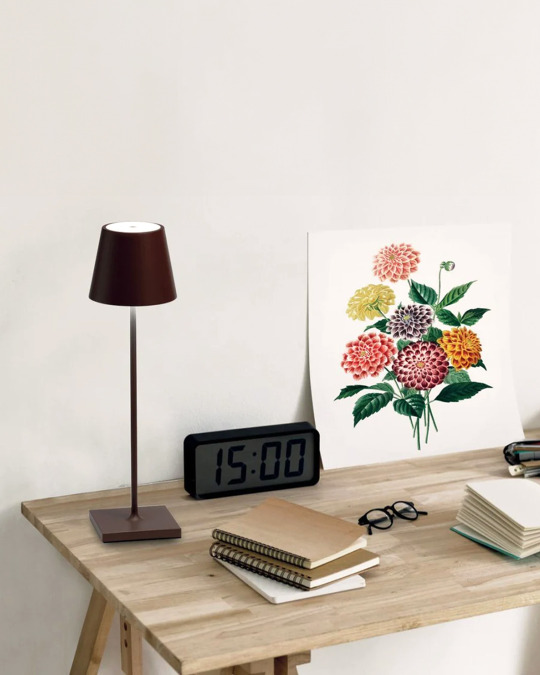
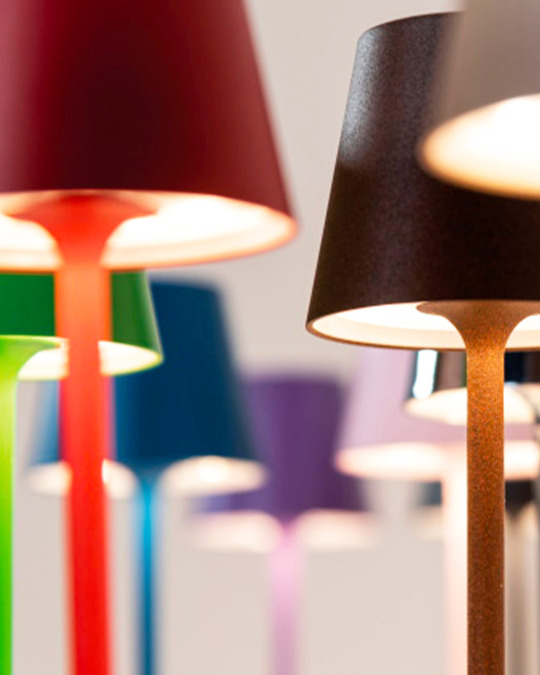
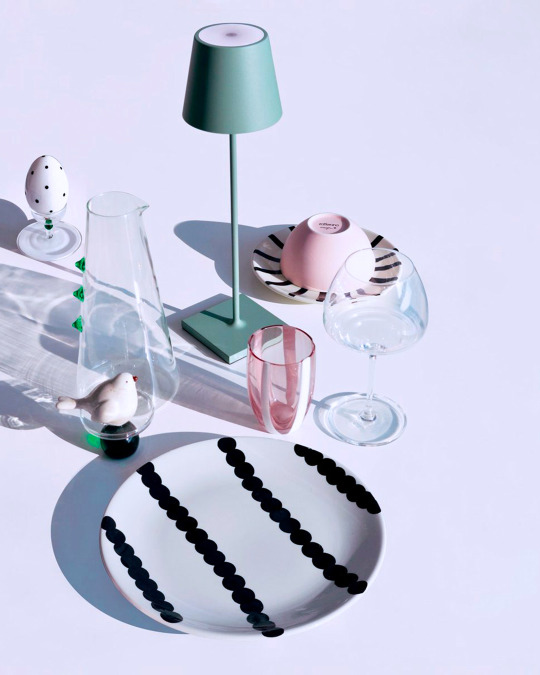
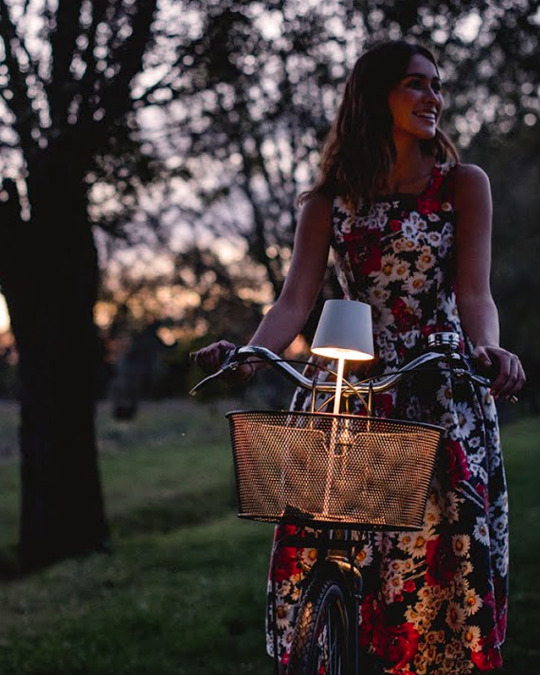
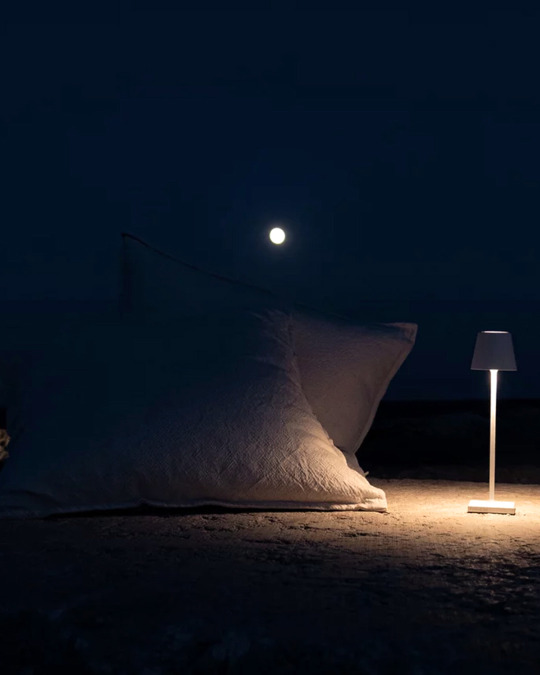
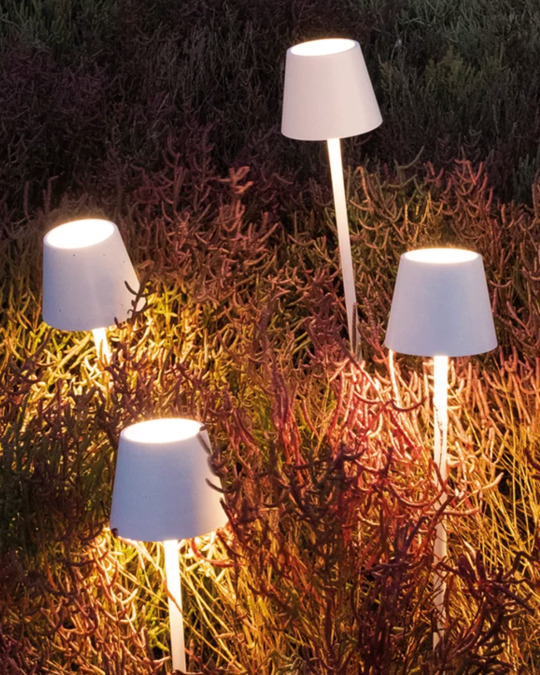
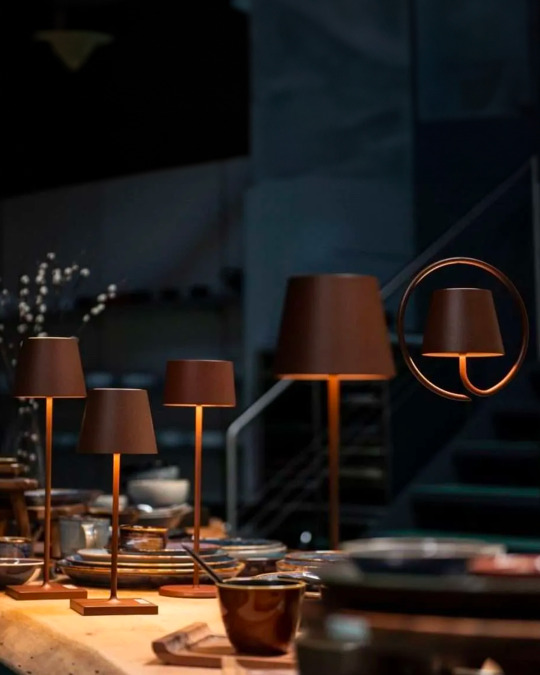
Poldina e il tocco magico? Un controllo "touch" nella parte superiore della testa che rende l'accensione, la regolazione dell'intensità luminosa e la scelta della temperatura di colore un gioco da ragazzi! 🎨
La collezione Poldina di lampade a batteria è disponibile in quattro varianti da tavolo, due da terra, a picchetto, a sospensione e a parete (ce n'è davvero per tutti i gusti!), queste lampade sono il sogno di ogni amante del design e della funzionalità.
La cosa che mi ha conquistato davvero è la sua versatilità: grazie all'alto indice di protezione, possono essere usate anche all'esterno (tranne i modelli con finitura a foglia metallica e finitura galvanica, che sono consigliati per interni). E non preoccuparti della durata della batteria, c'è un sistema di controllo elettronico che ti tiene sempre informati sull'autonomia residua, garantendo ricariche ottimali e senza sorprese!
Nella versione Pro tutte le lampade hanno una base di ricarica a contatto per rendere tutto ancora più facile 😌
Aggiungi al tuo carrello NOGRINCH! per avere subito uno sconto extra nel tuo carrello! 🎁
Il Natale comincia dalla Luce.
#StilluceStore#NoGrinch#Natale2023#Poldina#PoldinaZafferano#ZafferanoLighting#Sostenibilità#Green Living#Risparmio Energetico#Poldina Lamp#Poldina Pro#Zafferano Italia#Poldina Light#Idea Regalo
0 notes
Text
Ratana', Milano
Proprio accanto al giardino verticale, in un'area di sorprendente vivacità architettonica e paesaggistica di Milano, questo ristorante è ospitato in una vecchia e suggestiva costruzione che contrasta con il modernismo e la dimensione dei palazzi vicini.
La sala non è grande e il nero è preponderante. I tavoli piccoli sono molto vicini dando la sensazione di un notevole affollamento. Un bancone e una scaffalatura piena di bottiglie completano l'arredo impreziosito anche da lampade stile Poldina su ogni tavolo. Bella d'estate la possibilità di pranzare in una grande area esterna che si affaccia sui giardini circostanti.
La domanda di fonde è se questa osteria è tradizionale oppure no. Nel suo menu ci sono piatto milanesi come i mondeghili, la cassola e il risotto giallo con o senza ossobuco. C'è poi anche la cotoletta che però, e stranamente anche perché senza spiegazione, deve essere ordinata due giorni prima. Ci sone però poi le alacce di Lampedusa con burro, puntarelle e pan brioche oppure i tacos di baccalà che vanno in un territorio molto diverso dalla tradizione della citta'. Questo si riflette anche nei primi dove dei buonissimi ravioli ripieni di cima di rapa divergono completamente dalla tradizione milanese.
La lista dei vini è importante con qualche pagina di suggerimenti del mese e poi una serie di pagine contante etichette dove prevale l'offerta di vini naturali.
Servizio rapido, corte e piacevole.
Difficile però definire questo locale e capire se prevale una dimensione di immagine verso quella di sostanza.
0 notes
Text

#酒吧设计# #LEDbottlepresenter #Barsupplies #LEDbottleglorifiers #nightclubsupplies #barproducts #酒吧用品 #发光酒具 #suwin2899 #LEDbottleglorifier #bottleglorifiers #bottlepresenter #NEOZ #LEDtablelamp #poldina #kartell #luxciole #imagilights #cordlesslamp #ambientec #flos #tablelight #Pinterest #LEDstrobebaton #LEDstrobestick #LEDbarstick #LEDsparklers#Rechargeable table lamp
1 note
·
View note
Text
generic forenames
Adela Adelia Adric Ahari Ahmoud Aleshawna Aleta Alfrance Alfrandre Alger Alisley Allowe Alonica Alorelie Anaikalec Anald Analie Andra Angelbry Angele Angeloper Areem Arjord Armenton Arrolly Arwella Ashita Ashlyndia Aubrette Aurald Aureen Avana Avanne Bailee Barolynn Bastali Beato Benja Bertison Berto Berton Bindeen Binia Bisha Blaiden Blairo Blond Bobolie Bohdev Brandracy Brennie Briam Briena Brindhu Brine Brodi Brodney Bronwelle Brutumn Burly Caire Caitl Calalater Calyn Calypsody Carena Carie Cario Carlee Carlina Carmelvin Caron Carrana Carry Caseni Cassia Cathan Catriana Catroy Cayla Celcia Cerseine Cesca Cesira Chania Chanor Charek Charian Chario Charney Chasey Chasia Chastin Chlory Chrigit Chrissa Christice Clain Clandra Clard Cleona Clina Clott Colance Colemnita Concelle Conna Conson Contan Courtle Crisa Cylena Cyrendala Dacque Dadanee Dalest Damie Dandt Daniquel Daphan Daralesl Darlana Darrindhu Davensiel Davia Davidson Deandreus Delith Delory Dileena Diona Domia DonnaLi Druci Dustravia Duway Dysderite Edgarette Elandread Ellina Enriq Erine Erminique Eufemina Fariana Farina Faroland Favidson Ferton Filipa Francy Frashby Frick Frida Gabrick Gabrij Gally Giseli Glene Grapha Guada Hadwicka Haleska Halil Hanethan Hayla Heaffrey Helma Herly Hetta Holle Hortison Huetty Hyper Ireen Irista Isabellas Isabet Italal Italbot Izolacey Jacey Jacius Jackiefer Jacking Jamiro Janer Janette Jania Janie Jarvey Jasmia Jasmina Jasmira Jaycella Jeffred Jenne Jennes Jense Jeria Jerson Jessa Jessan Jethium Jocella Joele Johnnie Jolin Jonarcia Jonisa Josell Josypheld Julithium Juturan Kaire Karlo Karon Kasmicah Kasperbie Kateralda Kathaxton Katio Katya Keila Kendarwin Keviercy Keyes Khyllie Kievel Kimille Kirajiv Kirsty Kolet Koriel Krisha Krissica Kyrissus Lafateehl Laisia Lanelip Laramaal Larla Larlen Larlet Laurenton Lavenson Lavona Leelyndo Leill Leopat Leticus Lewith Lilibelle Lilliezer Lithia Lonne Lorette Lorev Louel Loundra Lowel Lowen Lucin Lumengel Lyrie Magine Malairis Maliam Malie Mandra Manfredia Marcia Marcissa Marek Marie Marile Marily Mario Maris Mariska Maristie Marlon Marrice Marvan Marvin Matal Matherry Mattie Mattis Maximus Maysia McKeelyn McKendro Mckie Mecolett Mecolon Melope Merney Might Mikelton Minga Miragh Mirisy Myrona Nafael Nandraige Nashby Nassa Natte Neila Nirva Nober Noradlin Noresca Octor Odesireen Olette Oliver Ontanthia Ophendra Ophenry Opher Oranza Paine Patie Paulain Pearlana Pearsha Perpete Phinia Poinella Poldina Presaria Prida Quinley Quinton Quita Rafish Raina Raise Raline Ramsyna Reeselle Rendy Rholonalu Romey Rosco Roybel Rozell Rudette Ruthbert Ruthysta Sabaner Sabio Sadelle Sahariah Saiya Salery Salice Samela Samera Sanda Satch Sefinnon Sendizia Sereen Serelle Sergia Sevin Sevitus Sharlen Sharles Sheem Sheer Shell Sheril Shermina Shriston Sonic Sophill Sosha Specia Stanfrey Stelix Stensie Steprine Strio Sugarlene Sunnie Sunsen Sylvince Sylvinco Symbramón Tanie Tayda Teralendy Terrisa Thole Tholet Tierce Tijuans Tilly Tippa Tobina Tobyn Tomonrada Trankie Uzzia Vandrogo Venda Vendo Vibrady Victra Viole Vivannona Walie Warty Welsoha Wendolyn Whita Winda Witney Xandina Ximeus Yahal Yandro Yasmiah Yasmica Yelea Yelen Yella Ysabet Zachala Zachan Zackam Zakirkley Zanen Zayna Zekie Zlemand Zylagh
1 note
·
View note
Photo

Illuminazione a 📌Taranto? 𝙁𝙧𝙖𝙣𝙘𝙠 𝙎𝙤𝙣𝙣 𝙃𝙤𝙢𝙚 ☎0997325011 #zafferano #albumlights #ole #signature #poldina #light4 #athmosphere #forestier #joinled #plust #antonangeli #lorenzoserafini #estiluzlighting #karman (presso Franck Sonn Home) https://www.instagram.com/p/ClmasmAoM65/?igshid=NGJjMDIxMWI=
#zafferano#albumlights#ole#signature#poldina#light4#athmosphere#forestier#joinled#plust#antonangeli#lorenzoserafini#estiluzlighting#karman
0 notes
Photo
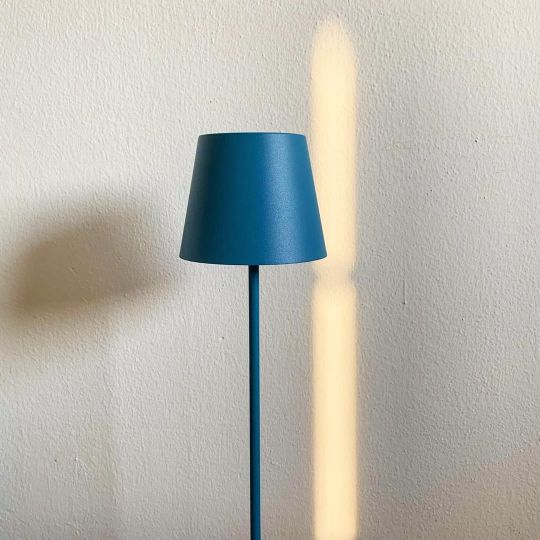
Morning sun. #sun #morning #light #design #lamp #lightdesign #interior #interiordesign #poldina #igersitalia #igersemiliaromagna #igersbologna @zafferanoitaliaofficial (presso Bologna, Italy) https://www.instagram.com/p/CDTGHHDKzrN/?igshid=1ej5sd0ukqz4w
#sun#morning#light#design#lamp#lightdesign#interior#interiordesign#poldina#igersitalia#igersemiliaromagna#igersbologna
0 notes
Text
Imperio al primino
« Senti » senti chi? « andiamo a giocare all`imperio del primino!» un ordine più che una richiesta; le brillano gli occhi, questi ora rivolti a LIS, lei già che si alza in piedi, lasciando lo specchio in mano a David «Io maschio e tu femmina??» chiede, concentratissima, senza guardarla direttamente, prima di annuire e lanciarsi al pescaggio del primino.
Sfila la bacchetta dalla tasca, pronunciando un «Ei, tu!» Cercherebbe di essere seria e imperiosa -appunto- ma non risulta troppo credibile «Imperio!» Agitando a caso il catalizzatore, senza l’intento di eseguire alcun incanto. «Iniziazione all’età adulta, sei stata scelta per questo gioco non puoi tirarti indietro e ora dovrai ubbidirmi»
[…]
«Obscuro!» Pronuncia, stavolta sicura, immaginandosi una benda che compare sugli occhi della giovinetta e puntando contro di essi la bacchetta. Tutto andasse bene la farebbe girare un paio di volte su se stessa, prima di condurla verso WILLIAM, lasciando che sia poi CORINE a dirigere il gioco
I due primini uno di fronte all`altro, fa girare il proprio (WILLIAM) su se stesso, per poi bloccarlo nuovamente frontale a POLDINA «Bene, ora avvicinati di un passo...» e guarda LIS, concentrata e seria se non per quel sorriso. «Un po` di più...» molto vicini, i due, talmente tanto che basta spingere appena la testa di William che NOW KISS.
«Ehi! Questo si chiama abuso di potere, per non dire bullismo, per non dire...» non lo sapremo mai, sta già iperventilando un po` per l`ansia d`aver perso un senso, un po` per l`interessante botta di adrenalina
«Niente di tutto ciò. Non è mai bullismo quello fra corvo e corvo » prima regola del crawclub; con tono calmo, mento alto, ad educare i nuovi pennuti.
E poi, vuoi per bloccare quell`urlo o per bloccare il secondo attacco di panico, o di crepacuore, che potrebbe venire al concasato... non ci pensa due volte a salvare eroicamente le vita di entrambi con uno SMACK sonoro
Un applauso in mezzo a una risata entusiasta. «Così si fa, queste donnine devono crescere al comando fin da piccole»
Li guarda dall`alto in basso entrambi e «Non ringraziatemi» fintamente snob, mentre si volta e si allontana, prima che WILLIAM inizi a sbraitare, tornando a ballare nella folla malamente saltando, le mani verso LIS per far intendere che la vuole con sé, prima di chiudere gli occhi e ciondolare in libertà.
4 notes
·
View notes
Text
CE&RoHs rechargeable table lamp waterproof IP54 USB cordless table lamp Aluminum body poldina light Bedroom lampada da tavolo
CE&RoHs rechargeable table lamp waterproof IP54 USB cordless table lamp Aluminum body poldina light Bedroom lampada da tavolo
BUY 10 LAMPS GET A FREE CHARGING SOCKET Dear Customers,You can get a free charging socket when you buy 10 lamps in any color .Please note the lamps color you want to buy and the charging socket you want to get in white or black. Cari clienti,Puoi ottenere una presa di ricarica gratuita acquistando 10 lampade di qualsiasi colore.Si prega di notare il colore delle lampade che si desidera acquistare…
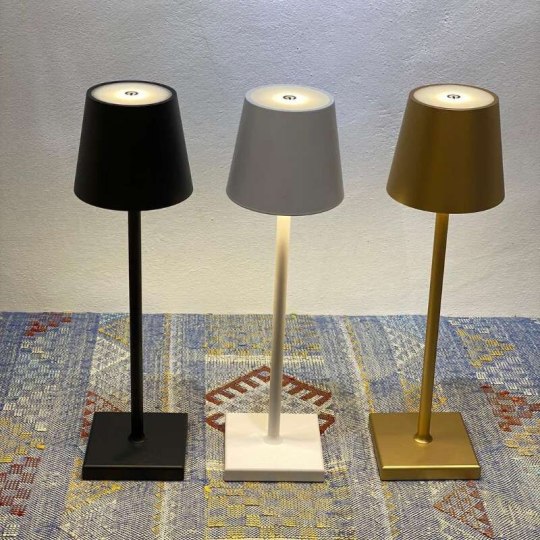
View On WordPress
0 notes
Text
Lampada da lavoro

Lampada da Scrivania LED T300 Lampada da lavoro con Ricarica Wireless 9V 5 Livelli Dimmerabili 2 Modalità di Colore Touch Luce Gradevole 48 LED Android iOS Adattatore QC 3.0 Certificato (Nero)
------ #AQUISTA_ORA Clicca il link__
Lampade da lavoro
------
· Illuminazione Gradevole: La Lampada da Scrivania LED T300 genera un'illuminazione piacevole ideale per la lettura, il lavoro e lo studio, che non affatica la vista. La Lampada da tavolo è dotata di doppia alimentazione, con cavo USB e Adattatore QC 3.0 comoda da utilizzare ovunque.
· Ricarica Usb e Wireless: La Lampada da Tavolo con Ricarica Wireless è semplicissima da utilizzare; sarà sufficiente posizionare il tuo smartphone compatibile sulla base della lampada per ricaricarlo.
#lamp #from #desk #led #table #lamps #light #with #bedside #table #wireless #usb #without #charging #bed #bedroom #wires #xiaomi #office #lamp #charger #lights #touch #reading #work #accessories #aukey #design #cellphone #study #objects #charge #girl #amazon #rechargeable #tv #battery #alexa #bedroom #basic #gaming #telephone #children #grip #clamp #smart #abat #black #jour #terra #poldina #odern #pc #things #photos #rgb #modern
0 notes
Link
This article is the story of Nadia Avraham, a trans Israeli Mizrahi woman who was born in Iraq and fled the country to escape antisemitism. Nadia paved the way for Israeli transgender people and her story is well-worth a read. As this is a premium Haaretz article, I will be posting the entire thing below.
It was the period of the War of Attrition, which followed hard on the heels of the '67 Six-Day War. Sheba Medical Center, Tel Hashomer, in Ramat Gan, was fully occupied, and the beds of the wounded spilled out into the corridors. Lying among the soldiers, on a bed at the end of a corridor, was a civilian, an alien in the military landscape, alive and hooked up to tubes, but completely covered by a blanket. The soldiers wondered who he was. Why doesn’t the man lying in the corner have any visitors, they asked the nurses. The odd figure became the main topic of conversation in the surgical ward, but the nurses refused to lift the veil of secrecy concealing his identity and the circumstances of his hospitalization.
Two weeks went by, and still no one came to visit. While soldiers continued to arrive steadily, the odd figure from the corridor left the hospital – the fourth person to undergo sex reassignment surgery in Israel.
That person is Nadia Avraham, who will celebrate her 85th birthday next month. “But I look good, still a bit sexy,” she says with a wink and a heavy Iraqi accent.
Avraham lives in the Hatikva neighborhood in south Tel Aviv, in a very small apartment. The bedroom also serves as the living room, and she shares her bed with a cat. On the walls are photographs from the 1970s, ‘80s and ‘90s – all showing a beautiful woman with big eyes and heavy makeup.
I recorded Nadia for the Hebrew version of “Israel Story,” a documentary podcast broadcast on Army Radio and online, of which I am one of the creators. (An English version is heard on a variety of NPR stations in the U.S., as well as on the website of Tablet magazine.)
Nadia opened all our meetings by saying, “It’s impossible to tell a whole life in a hour or two” – and then sat down on the edge of the bed, straightened up and, despite the constraints of time, started to tell her story.
She has blond hair, bright eyes, a piercing gaze and a singular style of speech that mixes words in Arabic with Hebrew, and in which one particular phrase is prominent: “Maybe yes, maybe no, only God knows.” That’s the essence of her complex worldview, rife with contradictions and an array of identities. Nadia is a “both one and the other” woman.
In one of our meetings, a moment before I turned on the recording device, she went over to the wardrobe and pulled out an old shoebox. In it were dozens of photos, some from a very different era, when she was still Naji, the son of an affluent Jewish family in Baghdad.
When Nadia remembers Naji, the boy she was, she speaks in the first person, but uses the masculine form of speech, adjusting the Hebrew to her biography. She talks about a boy from a large family, with an older sister followed by five brothers. Naji, the middle son, was very close to his mother.
When Naji was 5, a member of his close family started abusing him sexually. “I was afraid, I suffered, I was confused, I didn’t know what it was,” Nadia relates.
Naji did not tell anyone about what he was undergoing, and his psyche remained wounded. He fell ill, became withdrawn, and missed school. This went on for several years, and while his classmates advanced to primary school, he stayed behind, not learning how to read or write. He became a frightened boy, lacking self-confidence. According to Nadia, his worried parents took him to experts of different kinds and to psychiatrists across Iraq, but none of them understood what the child was going through – he refused to talk about it. “The secret stayed imprisoned within me,” Nadia says, “and life at home became unbearable.”
When he was 12, Naji ran away from home. He didn’t have a well thought-out plan, just took a bit of money and headed for the train station. He dreamed only of escaping to Egypt, Saudi Arabia or Kuwait, and starting life over. But shortly after he disappeared, one of his older brothers went to look for him and found the dreamy boy with a backpack at the entrance to the train station. He brought him home in angry and frightening silence. But Naji’s dream of leaving came true a few months later: His parents decided to smuggle him and his older sister far off, to pre-state Palestine.
A truck pulled up in the middle of the night, and Naji and his sister got into it, joining some 50 other people already crammed inside. The truck sped off toward its secret destination.
It wasn’t an orderly aliyah. Iraqi law prohibited Jews from leaving the country, but an escape route was created through neighboring Iran. Naji and his sister lived there with hundreds of Jewish migrants in crowded, dire conditions, slept in tents and made do with the minimal food that was distributed to them – bread with onion and tinned milk.
After a month in the Tehran camp, they were transported to Israel. Naji was happy to have the chance to turn over a new leaf. He was 14, his sister was 30. It took them time to adjust to their new life. They wandered from place to place, from Binyamina to Jerusalem and Rishon Letzion, before finally settling in Tel Aviv. They lived in a small home in the Hatikva neighborhood, which they purchased with money their mother sent.
Some months later, the rest of the family arrived in Israel. Naji, who had always been a mama’s boy, was thrilled to be back together with her. Within months of their reunion, however, his mother fell ill with cancer and died. Without her protection, Naji once more felt vulnerable and alone. Even today, when Nadia talks about her mother, she is visibly consumed with longing. She speaks of the loss as a kind of a “Sliding Doors” moment, and wonders whether her life would have been different if her mother had remained by her side.
After their mother’s death, Naji’s older brother, the same one who had forced him to return home from the train station in Baghdad, started to torment him. The house was no longer safe for Naji. “When I worked, he would take my money, or he would try to teach me to do bad things,” Nadia recalls. “He demanded that I distribute the drugs he sold, made me go to the homes of criminals. Once I tried to run away, but the police brought me back, because of my young age.”
At 16, Naji reported for a pre-induction army screening, thinking that perhaps the military would open the door to a better future.
“I tried, I wanted to go to the army,” Nadia explains. “When the day came, I entered a room filled with doctors and senior officers, and I asked, ‘When do I start serving in the Israel Defense Forces?’ But an officer said, ‘Go home, we don’t take people like you in the army.’ Maybe he meant that I had a feminine body,” she says. “I was as thin as a cue stick, and maybe they didn’t like my body. Maybe they didn’t like my behavior.”
As she tells the story of the event at the recruitment center, Nadia raises her voice and emphasizes the words, remembering the lean boy she was, and laughs. But between the lines and beyond the rolling laughter lurks the disappointment of a boy, somewhat different from other boys, facing a battery of officers, representatives of the establishment, alone. “To this day, I don’t know why they decided not to draft me,” she says.
The rejection by the IDF eliminated another possible route to an easier life as part of Israeli society, and heightened Naji’s distress. Once more he felt he had to escape – this time, for good. “At the age of 16 I ran away from home again,” Nadia relates. “I didn’t have anywhere to go. I lived on the street, slept on benches on Rothschild Boulevard in Tel Aviv. To satisfy my hunger, I would look for pieces of bread that someone might have thrown into the garbage. And it was hot, a hamsin.”
Victor Victoria
Life on the street was hard, aggravated by a feeling of loneliness, fraught with danger, a battle to survive – and it was a life that set Naji up for exploitation.
Nadia: “I prayed to God that someone would come and take me. Let him do whatever he wants, only let me go inside to wash up and maybe eat something, in his home or in a hotel, the main thing was to get through the night.”
Naji spent a few months living a homeless life on a bench on Rothschild Boulevard. Still, alongside the tremendous difficulties, he began to experience a thrilling sense of freedom. A new world was revealed to him.
“There was a place on Rothschild Boulevard where all the homosexuals used to gather. In the morning I sat on a bench without anything to eat or drink, and in the evening, when the gays arrived, I would forget about food and forget myself – all I wanted was to look at them. One was named Merry-Man, another Poldina, and another Aunt Fanny, and they were from every ethnic group: Persians, Iraqis, Poles. They laughed and talked, and I was envious of them for having such a beautiful life and being able to live with their families, while for me it was hard, living on the street and sleeping on benches.”
On those Tel Aviv nights, Naji felt that he belonged for the first time in his life. “I met a gay guy who wandered around the parks, and he called me Nadia, he was the first to give me that name. I hooked up with him and he took me to his family in Or Yehuda.” From then on, Naji’s name was Nadia. The friend who gave him the name was Victor, who afterward became Victoria.
Victor lived with an elderly, childless Romanian couple who had informally adopted him and afterward did the same with Nadia. It was they who rescued him from the street. Nadia lived with them for eight years. “They were lovely, good people,” she says. “My life with them was the happiest I’d known, much more than with my family, whom I’d rid myself of.”
During those years, Nadia worked in a laundry, running a dry-cleaning machine that needed quite a bit of manual assistance. In the morning, she awoke happily to another day of work; in the evening she went out with her gay companions on the streets of Tel Aviv.
“In that period,” Nadia recalls, “Victoria and I met a dancer named Miko. He suggested that we go to Belgium, buy a wig and a dress, work as women and make a bundle of money. I don’t know whether I believed him or not, but I did it. I quit my job, got severance pay and went to Belgium with Victoria. We started to work as cross-dressers. At night I would dress up as a woman, and during the day I was a regular guy.”
Still not knowing how to read or write, but with acute street smarts, Nadia worked in Europe and met people from all classes of society. “I didn’t really know what to do with the money,” she notes. “For 15 years I lived in Europe, going from city to city, without knowing any languages other than Hebrew and Arabic. Trying to go deal with people who spoke Flemish, French, English, Turkish and Ladino. But I learned and I matured. I didn’t learn perfectly, but I started to get along. I would call to people, ‘Hello, come here, do you want to make love?’”
I try to ask Nadia about the hardships of night life, the world of clubs, the striptease acts and the prostitution, about the violence and exploitation that her life must have entailed. But she rebuffs the question even before I finish asking it. “There, I felt free and strong,” she asserts.
As we speak, it occurs to me that “freedom” is a relative term – elusive, era-dependent, biography-dependent, gender-dependent. The freedom she had in Europe was juxtaposed with her history, her past, the vulnerability, the secret and the rough life she had endured at home.
But as the years passed, Nadia’s attitude toward freedom and the “glamorous life” in Europe changed. After 15 years, she relates, “I felt that I couldn’t go on like that. I’d already started to become older, you could say, and I decided to return to Israel. I wanted to leave that way of life completely. I didn’t want it. I was revolted or despairing.”
The Surgery
Back in Israel, Nadia tried to start over. She found a job washing dishes in a Tel Aviv restaurant, but the regular hours and the minimum-wage work under a tough boss-woman was not for her. “The proprietress really tormented me,” she recalls, “until one day I took off the apron, threw it in her face and told her, ‘The salary I get from you in a month, I can earn alone in an hour.’”
She stalked out, and in the meantime moved in with Carol, a friend she’d known since the days on the boulevard bench. “I lived with him at the corner of Dizengoff and Ben-Gurion Avenue, on the top floor. One day, as we were talking, he suddenly says to me, ‘Nadia, if you want to have a sex-change operation, now’s the time. There’s an American doctor here, now.’”
Sex-reassignment surgery was almost unknown in Israel at the time, but it wasn’t a new concept to Nadia: “In the years when I worked in Europe, I met lady-men and also transvestites of all kinds.” Some of them had the surgery. She felt that this was what she had to do. Not hesitating for a moment, she met with the physician. As soon as he saw her, she says proudly, he agreed to operate. He explained the cost, told her about the process itself, the recovery period, and sent her for diagnosis by a psychiatrist, who also gave his immediate approval. A week later, she was in Sheba Medical Center among the wounded soldiers.
After the physical transformation, Nadia had to cope with the official, bureaucratic changes, including her gender classification in her ID card and passport. Unlike today, no orderly procedure for all this existed in early-1970s Israel. The Interior Ministry, flummoxed, sent her to the Health Ministry, which ruled that a person who wished to change his gender officially records had to go before a medical committee.
“I came to the committee, lay on the bed, opened my legs. I was examined by about 12 doctors, and they all said, ‘You are a woman in every respect, except that you can’t have children.’ I understood, and said, ‘Children there will definitely never be.’ I went back to the Interior Ministry and they immediately changed my ID and passport from ‘male’ to ‘female.’”
With her brand new passport, which bore the photograph of a woman, Nadia flew to Europe once more, this time to Berlin. “I was supposed to work next to a hotel, go up with each client, agree with him on a price of 30 or 50 marks, and then sleep with him And I wasn’t used to that kind of work. When I worked in the clubs, I would lure them with drinks, and I knew how to get more and more money from them without giving anything in return.”
In short order, however, Nadia returned to Tel Aviv – this time to stay. She worked in a nightclub on the seaside promenade. “Every client whom I could tell had plenty of money, I turned into my regular client. If I were to count the number of men I met in my life, it would be the length of a bridge from here to New York,” she says with resounding laughter. “All the rich guys, all the men who have inferiority feelings and are ashamed with their wives, they all came to me at whatever price I wanted.”
Eventually Nadia made enough money to buy an apartment in the upscale Bavli neighborhood in Tel Aviv’s Old North – a place she could call home, and which afforded her quiet and security.
One evening, a friend told her that she’d met a boy of 14 who’d run away from home and was sleeping in the street. Nadia felt that life had destined her to meet with this boy, whom she herself had been, sleeping on benches and hungry for bread. She asked her friend to bring the boy to her. Immediately she made a place for the boy, whose name she asks not to share, in her home and in her heart. Nadia, who had survived alone her whole life, raised him like a son.
At the age of 18, the youth was drafted into the air force. After his service he married and fathered children. Nadia remained by his side throughout, but the boy who matured into a man was unable to bear the difficult memories of his earlier life, and died suddenly and tragically. Nadia was shattered. It was the first time she had allowed herself to truly get close to someone, to create a family of her own.
“It was terribly hard for me,” she says now. “I couldn’t function anymore. He was the most precious thing in the world for me. No siblings and no family and no one else – only him.”
Nadia invited the widow and her two small children to move in with her. They lived together as a kind of family for 18 years, until the relations between them grew too complex and Nadia again felt that she had to leave home in order to preserve her freedom: “I really didn’t want to return to the kind of life I had lived with my family [growing up], to deal with difficult relationships, so I picked myself up and went, and left them the house, with no misgivings.”
The family of the adoptive son continued to live in Nadia’s spacious home in the Bavli neighborhood, while Nadia, who hadn’t been in touch with her own siblings and their families for years, returned to Hatikva. She moved into a one-room apartment that her father, who had since passed away, had left her in the family compound. She now lives in proximity to her brothers (her sister is no longer alive), but has no contact with them, she says. Time hasn’t dulled the pain. Nadia is unforgiving, but also unafraid, of them or of anyone.
“With all the suffering I went through, God always loved me and always looked after me, maybe he pitied me, I don’t know,” she says.
Donating a Torah
I’m in Nadia’s small room. We’re listening to the radio, to the very program we recorded in which Nadia is the star and tells her story in her voice. Occasionally she confirms what’s being broadcast, saying, “It’s all true, on my father’s grave.”
Photographs of Nadia in her youth peer out at us from the walls. She looks at them and says to me with a half-smile, “Old age will grab everyone in the end, there’s no one who won’t die.” Contemplating her death, she says with a wink that she deserves to be buried in Tel Aviv’s historical Trumpeldor cemetery, next to all of Israel’s founding fathers. But what’s truly important to her is to donate a Torah scroll in her name to the neighborhood synagogue. Nadia answers to no one but God and herself.
Now, at 85, Nadia has come full circle with her past, with the memories that well up and with the freedom she craved – and, finally, achieved: “I had it very good, and I loved my life. From the time I ran away from home and until I got to the cross-dressing and afterward the operation, and beyond, I was always happy in my life. I wanted and I chose and that’s the most beautiful and the best thing in life. I did what my heart demanded and what it wanted. That’s all. There’s nothing more beautiful than that. Live free in life and you have it good.”
12 notes
·
View notes
Text
Debora Sbarra – Riccioli d’oro (2010)

Playlist
Debora Sbarra – 01. Por Mi Fisa (2:44) Debora Sbarra – 02. La smorfietta (2:35) Debora Sbarra – 03. Ricordando Venturi (3:16) Debora Sbarra – 04. Elettrico (4:21) Debora Sbarra – 05. L’acrobata (3:05) Debora Sbarra – 06. Poldina (2:05) Debora Sbarra – 07. La giallina (2:11) Debora Sbarra – 08. Perle di cristallo (4:37) Debora Sbarra – 09. Anna (3:34) Debora Sbarra – 10. Debby (3:06) Debora Sbarra – 11. Virtuosismo (2:49) Debora Sbarra – 12. Riccioli d’oro (2:14)
Debora Sbarra – Riccioli d’oro (2010) published first on https://soundwizreview.tumblr.com/
0 notes
Photo










Autumn “urbex” trip to Kladno. Poldina captured in the last stage of it’s history. Strongly recommended.
35mm Film, Zenit 11, no filter
#Kladno#urbex#architecture#industrial#Poldi#Vojtěšská huť#analog photography#zenit11#35mm#35mm photography
3 notes
·
View notes
Text
POLDO e POLDINA
Poldo e Poldina erano due fratelli gemelli venuti al mondo e abbandonati come Mosè, furono deposti all’interno di una grande cesta impermeabilizzata sulle rive dell’Arno. Poldo e Poldina erano due fratelli gemelli venuti al mondo e abbandonati come Mosè, furono deposti all’interno di una grande cesta impermeabilizzata sulle rive dell’Arno. Come narra la Bibbia che Mosè fu salvato dalle acque;…

View On WordPress
#favole buonanotte#favole da leggere#Fiaba animali#fiabe#fiabe bambini#fiabe brevi#fiabe buonanotte#letture bambini#racconti#storie bambini
0 notes
Text
Nau Brasília
Com uma proposta diferenciada, o Nau Brasília é especializado em frutos do mar, utilizando entre seus ingredientes produtos tipicamente brasileiros, a exemplo de macaxeira, manteiga da terra, nata, queijo coalho e queijo de manteiga. O cardápio é bastante diversificado, oferecendo excelentes opções de entradas, saladas, pratos principais com camarão, peixes, lagosta, polvo, lula, mexilhão, moquecas, massas e sobremesas. Para os que não desejam frutos do mar, o NAU possui receitas especiais de carne e frango, com destaque para a Costela de Porco do Cais e para o Filé Balarvento. Para harmonizar com as refeições, o NAU sugere suco de frutas, água de coco ou uma deliciosa caipirinha/caipiroska de frutas.
E, para quem deseja relaxar um pouco mais, não faltam opções de bebidas com destaque para a carta de vinhos, com aproximadamente 150 rótulos das melhores regiões vinícolas do mundo.
Nau Brasília Cardápio
Os pratos são feitos com ingredientes de qualidade, seguindo as receitas exclusivas do Nau. A equipe do Nau prepara diariamente na nossa cozinha os insumos, molhos e guarnições, oferecendo maior segurança ao alimento e um sabor especial. Entre os pratos do cardápio mais destacados estão o Camarão Nau, Camarão Fortuna do Mar, Camarão Poldina, Camarão Cinco Mares, Filé de Peixe com Camarões salteados, Moqueca de Camarão e Peixe, Massa de Frutos de Mar, Chapa de Frutos de Mar, entre outros. Para aqueles que preferem se deliciar de uma carne, o Nau possui receitas saborosas: Filé Barlavento, Costela de Porco do Cais, Filé à Parmegiana, Filé de Frango do Leme e Filé de Frango à Parmegiana.
Nau Brasília Adega
Uma adega diversificada e com excelentes vinhos transforma a refeição no Nau em uma experiência única. Possui aproximadamente 150 rótulos procedentes das principais regiões vinícolas do mundo. A equipe Nau está em contínuo treinamento para oferecer aos nossos clientes um ajuste harmônico entre nossos camarões, carnes, peixes e vinhos.
Nau Brasília Eventos
O Nau tem o espaço ideal para todos os tipos de eventos: festa de aniversário, confraternização, evento corporativo, apresentação de produto, coquetel, etc. O restaurante oferece para grupos maiores de 50 pessoas pacotes com preços por pessoa. Consulte e faça o seu evento no Nau e surpreenda os seus convidados.
Vagas Nau Brasília – Trabalhe Conosco
Se você tem paixão pelo que faz e garra para alcançar seus objetivos, junte-se ao time d0 Nau Brasília. Para alcançar seu objetivo de negócios, a empresa procura os melhores talentos e profissionais que queiram crescer continuamente com a empresa. Você se encaixa neste perfil? Acesse o site da empresa e envie o seu currículo.
Horário de Funcionamento Nau em Brasília
Seg a Sex das 12h às 15h30 e das 18h30 às 23h / Sáb das 12h às 00h / Dom das 12h às 22h
Endereço e Telefone Nau em Brasília
Setor de Clubes Esportivos Sul, Trecho 2 , Conj. 41, s/n – Asa Sul – Brasília – DF
Telefone: (61) 3252-0155
Site, cardápio, valor, buffet e reservas
Mais informações: www.site.naufrutosdomar.com.br
Mapa de localização
from https://www.encontrabrasilia.com/sobre/nau-brasilia/
0 notes
Link
Free Poldina Table Lamp With Orders of Select Brands Over $400. Tap offer to copy the coupon code. Remember to paste code when you check out. Online only.
0 notes